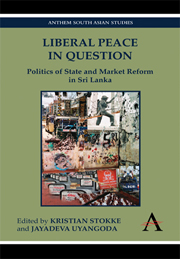Book contents
- Frontmatter
- Contents
- List of Illustrations
- List of Contributors
- 1 Liberal Peace in Question: The Sri Lankan Case
- 2 Travails of State Reform in the Context of Protracted Civil War in Sri Lanka
- 3 Fallacies of the Peace Ownership Approach: Exploring Norwegian Mediation in Sri Lanka
- 4 The Politics of Market Reform at a Time of Ethnic Conflict: Sri Lanka in the Jayewardene Years
- 5 From SIHRN to Post-War North and East: The Limits of the ‘Peace through Development’ Paradigm in Sri Lanka
- 6 Buying Peace? Politics of Reconstruction and the Peace Dividend Argument
- 7 Women's Initiative in Building Peace: The Case of Northern Sri Lanka
- 8 Liberal Peace and Public Opinion
- Notes
- References
7 - Women's Initiative in Building Peace: The Case of Northern Sri Lanka
Published online by Cambridge University Press: 05 March 2012
- Frontmatter
- Contents
- List of Illustrations
- List of Contributors
- 1 Liberal Peace in Question: The Sri Lankan Case
- 2 Travails of State Reform in the Context of Protracted Civil War in Sri Lanka
- 3 Fallacies of the Peace Ownership Approach: Exploring Norwegian Mediation in Sri Lanka
- 4 The Politics of Market Reform at a Time of Ethnic Conflict: Sri Lanka in the Jayewardene Years
- 5 From SIHRN to Post-War North and East: The Limits of the ‘Peace through Development’ Paradigm in Sri Lanka
- 6 Buying Peace? Politics of Reconstruction and the Peace Dividend Argument
- 7 Women's Initiative in Building Peace: The Case of Northern Sri Lanka
- 8 Liberal Peace and Public Opinion
- Notes
- References
Summary
Introduction
For most women living in the conflict-ridden areas of Sri Lanka, violence and brutality are part of everyday life. They have suffered sexual assaults, attacks and disappearances in times of violence in addition to the domineering power relations and the general insecurity in the social context and everyday conflict situation that have lead to an overall loss of freedom for women. Women became widows overnight due to the death of their husbands; they became husbandless when their spouses disappeared and they were isolated from their community due to their stature of vulnerability caused by the war. As a result, women as survivors of war have had to find ways of coping with the pain and with reconstructing their family and social units.
However, the impact of war on women in Sri Lanka has not only been a very personal and painful experience, but has also caused long term social consequences. Conditions of war and prolonged suffering have forced women to take new steps and responsibilities, both within their families and communities. One of these steps has been women's public role of making peace; an action which has put great pressure on these women as it is both socially and politically unacceptable to do so. Many women risk being stigmatised and marginalised by their family and community, besides being under political threat for initiating peace.
This paper therefore brings up the question of gender in the 2002 peace process and in formal and informal peacemaking. Starting from women's individual and collective initiatives for building peace, this paper critically analyzes women's role in the formal peace process in Sri Lanka.
- Type
- Chapter
- Information
- Liberal Peace in QuestionPolitics of State and Market Reform in Sri Lanka, pp. 141 - 156Publisher: Anthem PressPrint publication year: 2011



